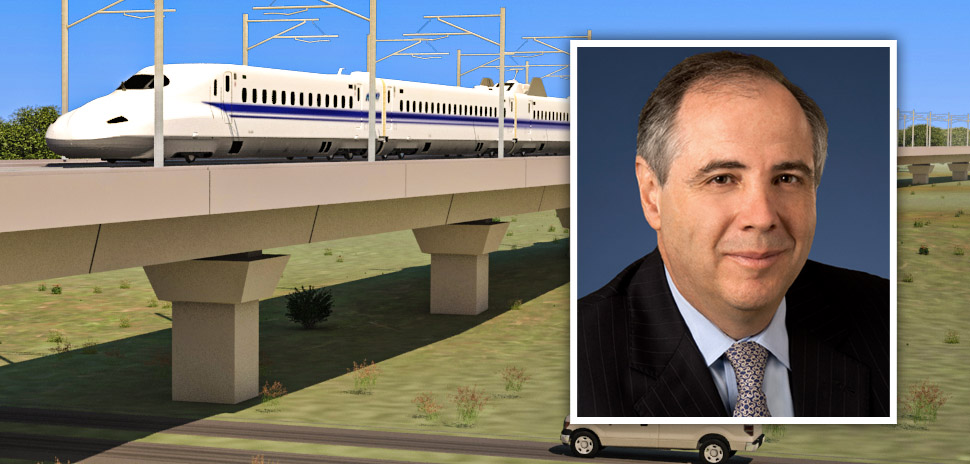Texas Central High-Speed Rail CEO Carlos Aguilar Announces Departure
 $30 Billion and still it won't roll
$30 Billion and still it won't roll“Given news reports in the international press today, I am announcing my departure from Texas Central,” Aguilar wrote on LinkedIn.
A Spanish news site in Madrid, “La Informacion,” reported that the entire management team of Texas Central has departed, and the project has entered “a hibernation phase in search for financing.”
In 2018, Texas Central signed an agreement with Renfe, a Spanish train operations company, to be “the project’s strategic operating partner.”
 Carlos Aguilar, president and CEO of Texas Central, has resigned
Carlos Aguilar, president and CEO of Texas Central, has resignedAguilar’s biography has been missing from the Texas Central website since April, and no executive team members are currently listed on the site.
“We are not surprised to hear the news of Carlos Aguilar’s departure,” Judge Trey Duhon, a board member of Texans Against High Speed Rail, told The Texan in an email.
“The unorthodox LinkedIn announcement speaks to the company’s lack of staff, lack of resources, and lack of leadership, with no successful path forward. No money, no permits, no progress…. It is abundantly clear that this project is more than dead in the water, especially when the captain jumps ship,” he added.
Aguilar’s resignation statement went on to say that he is proud of the accomplishments of Texas Central, including “end to end regulatory approvals for the first true high-speed rail project in our nation’s history.”
“This was a most conscientious and complex endeavor, carefully addressing concerns from land owners, stakeholders, and providing opportunities to all sectors of our society, a FIRST for US Infrastructure,” he added.
Aguilar’s statement hinted at some doubt about the project’s future, saying, “eventually, this team could implement this desperately-needed project” and taking some of the blame upon himself by adding that he “could not align our current stakeholders on a common vision for a path forward.”

The Supreme Court of Texas has yet to issue its ruling in the case of Miles v. Texas Central Railroad & Infrastructure. In January, the court heard oral arguments about whether Texas Central has eminent domain authority to seize private property along its proposed route.
While the Federal Railroad Administration (FRA) issued its final rule for regulating the high-speed rail project in September 2020, Texas Central must still make an application to begin construction with the Surface Transportation Board. It has yet to do so.
When originally pitched, the project was supposed to be entirely privately financed. Its website states, “Texas Central is an investor-funded company utilizing a market-led approach to financing, led by a group of primarily Texan investors. The Railroad will not seek grants from the US Government or the State of Texas, nor any operational subsidy once operation begins. The project will be financed with a blend of debt and equity.”
However, in 2020, its then-Chairman of the Board of Texas Central Drayton McLane Jr. sent a letter
to Texas Senator Robert Nichols (R-Jacksonville) indicating the project
had encountered economic difficulties and was looking for funds it “hope[d] to receive from President Trump’s infrastructure stimulus through the Department of Transportation.”
Furthermore, on a podcast in October 2021, Aguilar stated, “I think whatever happens with the infrastructure [bill] is key to us. I believe that would be the final element that would bring us together,” he said, adding that they need about $12 billion in loans.
Also indicative of possible problems was an announcement last fall by the owners of the land proposed for the three stations along the high-speed rail route, that they intend to form a separate entity, Texas High-Speed Rail Station Development Corporation (SDC), for building the stations along the route.
Developer Jack Matthews and investor John Kleinheinz formed the SDC entity and intend to begin discussions with “various third parties who have successful experience with high-speed rail.”
Their press release included hints that the agreement between Japan and Texas Central may not be as solid as once accepted. While saying that they believe that the United States and Japan will reach an agreement, they go on to say, “If a solution involving the Shinkansen system cannot be reached, our station sites will be used to make sure high-speed rail comes to Texas and integrates with the rest of the nation, using the best technology offered.”
Texas Central did not reply to a request for comment about its future before the time of publication.
2 comments:
The one in CA has been a complete boondoggle. We MAY end up with a semi-high speed train between North Buttcrack and South Buttcrack in the central valley but that only because Newsom does not want to pay back the feds their front money if NOTHING is built. The performance guarantee (which was written into the law) is gone, the costs have skyrocketed, the management has been inept and those are the good points. It is essentially a jobs program for democrat construction unions.
Sometimes things don't work out. Adios.
Post a Comment